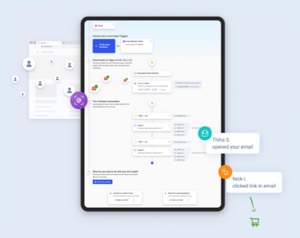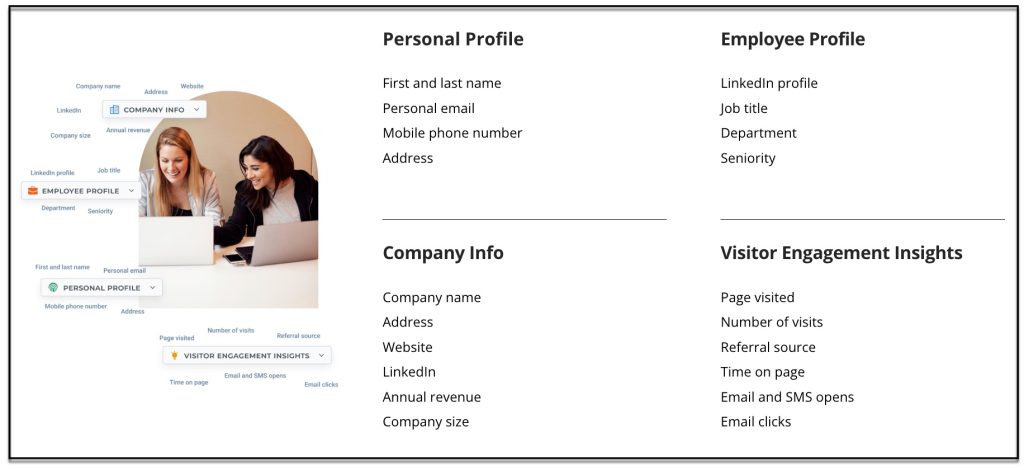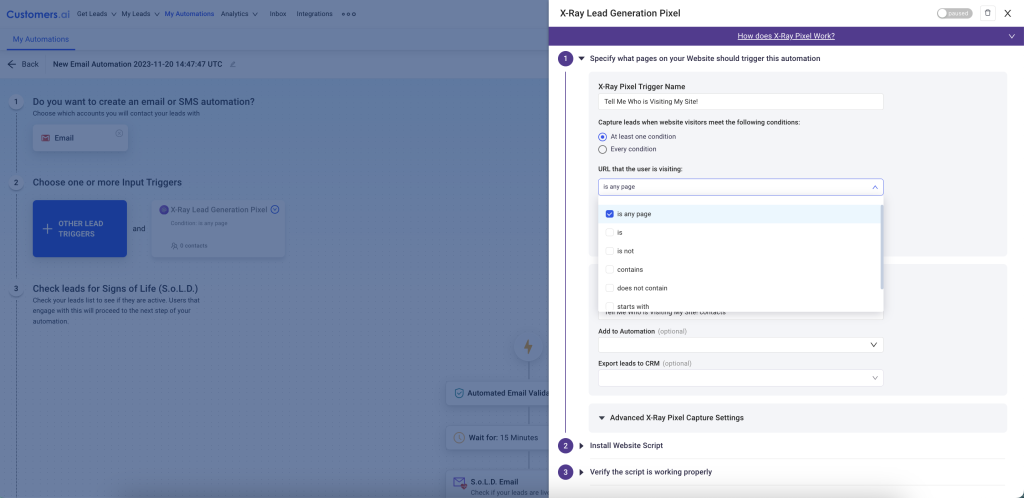For years, marketing and sales teams relied on IP data for everything from lead generation to ad targeting to analytics and contact enrichment. After all, the ability to identify attributes like who is visiting your site and where they live can go a long way toward better targeting and outreach.
Unfortunately, times have changed and the reverse IP lookup tools we relied on for so long are no longer as powerful as they once were.
People are working remotely, company-level data isn’t as valuable as it once was, and when it comes to advertising, we want and need more than just location-based targeting.
Reverse IP lookup is dead and it’s time for sales and marketing teams to evolve.

See Who Is On Your Site Right Now!
Get names, emails, phone numbers & more.
Try it Free, No Credit Card Required
Understanding the History of Reverse IP Lookup
Before we get into the why and what’s next, we have to first understand how we got here.
Reverse IP lookup has been around for a long time. In fact, it has its roots in the early days of the internet when cybersecurity professionals sought to identify the origins of online activities.
Initially used for network troubleshooting and security, reverse IP lookup evolved over time to become a marketing and sales tool, providing insights into website visitors and their associated organizations.
What is Reverse IP Lookup?
Reverse IP lookup is a technique used to uncover information about a particular website or online service by analyzing the associated IP address.
Unlike a standard IP lookup, which reveals the domain associated with an IP address, reverse IP lookup does the opposite – when you perform a reverse IP lookup, you input an IP address, and the tool provides details such as the domain names hosted on that IP, the geolocation of the server, and sometimes even information about the organization that owns the IP range.
In the realm of marketing and sales, reverse IP lookup is a strategic approach used to uncover details about the companies visiting a website based on their IP addresses, enabling marketers and sales teams to turn anonymous website traffic into actionable data.
What Information Do Reverse IP Lookup Tools Provide?
Reverse IP lookup tools work by revealing the associated domain names hosted on a specific IP address. This includes details such as:
- Organizations or companies behind the domain/s
- Geographical locations of servers
- Additional insights into the technology infrastructure
How Has Reverse IP Lookup Been Used in Marketing and Sales?
Marketers and sales teams leverage reverse IP lookup tools to uncover the identities of companies visiting their websites for lead generation efforts.
This information enables sales teams to prioritize outreach, focusing on businesses with the highest potential impact. Additionally, in Account-Based Marketing, reverse IP lookup allows marketers to tailor campaigns and personalize website content based on the companies showing interest.
From competitor analysis and targeted event promotion to enhancing ad retargeting efforts, reverse IP lookup has been used to refine and optimize various aspects of the marketing and sales funnel.
Convert Website Visitors into Real Contacts!
Identify who is visiting your site with name, email and more. Get 500 contacts for free!
Why Reverse IP Lookup No Longer Works
If we want to go way back to the early aughts, you might recall that tools like Google Analytics showed us IP and company data. That’s right, we could actually see the IP addresses and company names of our site visitors.
Because we can’t have nice things (and the whole privacy thing), Google took that away, and reverse IP tools came to the rescue.
The problem nowadays is that IP-level data is just the tip of the iceberg when it comes to sales prospects and consumer data. We need more information to be able to reach them effectively.
There are also other challenges at play. Let’s look at five reasons reverse IP lookup no longer works:
1. Remote Work Killed the IP
It’s no secret that COVID changed the corporate landscape and made IP-based tracking extremely difficult. According to data from WFH Research, in August 2023, 13% of full-time employees were fully remote and 30% were in a hybrid arrangement.
With 47% of people working from anywhere they want, IP lookups don’t produce the high match rates they once did.
2. Email Restrictions Keep Coming
With Google rolling out its new AI spam filter in December and new spam filter restrictions launching in February, the inbox is getting tight.
For sales teams that have traditionally relied on reverse IP lookup data to identify the names of companies who visited their website, strategies are going to have to change. You can no longer identify the company and then email a bunch of people at said company.
You will be marked as spam, your deliverability will be hurt, and you could potentially get blocked.
3. Mobile Adoption Has Long Passed
We are no longer waiting for mobile adoption. That ship has sailed. In Q2 2023, 57% of internet users spent their time browsing the internet via mobile phones. That means more than half the people in the world are not on static IPs.
Mobile devices have both static and dynamic IP addresses that are entirely dependent on the cellular or Wi-Fi network you are connected to, making reverse IP lookup even more complicated and even less effective.
4. Customer Expectations are Rising
Per McKinsey, 71% of consumers expect companies to deliver personalized interactions. Personalization goes beyond knowing the company someone works for or where they live.
Personalization means knowing their name, their company, the product or service they are looking for, and much more. Reverse IP lookup tools can’t give us that level of data.
5. Ad Targeting Options are Declining
If you only know company and location-level data, ad platforms can help you fill in the gaps. You can refine your audiences by demographic data, interest data, behavioral data, and more.
Or at least you could.
Facebook targeting options continue to shrink and in some cases, are not even accurate.
Google Ads continuously tries to make life hard on advertisers and now, with cookie deprecation rolling out in 2024, building audiences across multiple channels is going to be much more difficult.
Moving forward, marketers are going to need a lot more than IP-level data to run successful ad campaigns.
The Future is Website Visitor Identification
What was once enough, is no longer. Sales and marketing teams must be thinking about the future and the future is website visitor identification.
Website visitor identification allows you to go beyond just company names and locations.
The Customers.ai Website Visitor ID X-ray pixel can identify names, companies, personal and work emails, phone numbers, pages visited, domains, LinkedIn profiles, and so much more.

This is not just company data!
This is PERSON-level data that will help both B2C and B2B sales teams build highly-targeted outbound sales campaigns with personalized messaging.
Website Visitor Identification vs. Reverse IP Lookup
- Warm leads. With reverse IP lookup, you are guessing who from that company visited your site. With X-ray, you know exactly who from that company visited your site. Hello warm leads and bye bye cold outreach.
- Real-time contact info. Reverse IP lookup tools give you the data and maybe they’ll give you names and emails of people who work at an organization. You still have to do the research to find out if those people fit your ICP. X-ray gives you real-time data. You know who is on your site right now and can reach them while they are warm.
- Improved efficiency. Using segmentation, website visitor identification can tell you who the high-value prospects you should be spending your time on are. For example, you can target those showing buyer intent (people who have visited the pricing page or the request a demo page), saving your team time and improving your odds of closing.
- Better ROI. Reverse IP tools result in contacts that might not be relevant to your business. Why spend money nurturing them? Website visitor identification tools give you contacts who are already familiar with your business. Put these contacts into your lead nurturing campaigns – email automations, ad retargeting campaigns, etc., for better audience targeting and better ROI.
Get Started with Website Visitor Identification
Whether you’re B2B or B2C, it’s time to move away from tools that rely on reverse IP lookup to give you contact data.
Times have changed, technology has changed, and consumer expectations have changed. The old way of doing things isn’t going to work and if you want to be successful, you had better adapt.
Customers.ai Website Visitor ID X-ray pixel can give you real-time data in 90-seconds or less.
To install the Website Visitor ID X-Ray Pixel, sign up (for FREE!), go to your dashboard, and navigate to My Automations.
Select + New Automation and get your pixel. We have easy install options for Google Tag Manager, WordPress, and Shopify, or you can install the pixel manually.

We are excited about what the future holds and truly believe that this is a game-changer for sales and marketing teams.
Want more information? Get a demo from our team today.

See Who Is On Your Site Right Now!
Get names, emails, phone numbers & more.
Try it Free, No Credit Card Required
Important Next Steps
- See what targeted outbound marketing is all about. Capture and engage your first 500 website visitor leads with Customers.ai X-Ray website visitor identification for free.
- Talk and learn about sales outreach automation with other growth enthusiasts. Join Customers.ai Island, our Facebook group of 40K marketers and entrepreneurs who are ready to support you.
- Advance your marketing performance with Sales Outreach School, a free tutorial and training area for sales pros and marketers.
Reverse IP Lookup FAQs
Q. What is a reverse IP lookup tool?
Reverse IP lookup tools reveal information about the domains hosted on a specific IP address.
Q. How do reverse IP lookup tools work for sales and marketing?
Reverse IP lookup tools identify companies visiting a website, aiding lead generation and personalized marketing efforts.
Q. Are reverse IP lookup tools effective for lead generation?
While they were effective in the past, evolving privacy measures and increased use of VPNs have diminished their accuracy for lead generation.
Q. Can reverse IP lookup tools prioritize sales outreach?
Yes, by revealing companies’ interest, sales teams can prioritize outreach efforts for higher business impact.
Q. How does reverse IP lookup support Account-Based Marketing (ABM)?
Reverse IP lookup helps tailor ABM campaigns by providing insights into industries or companies displaying interest.
Q. Why personalize content with reverse IP lookup data?
Personalizing content based on visiting companies ensures a more relevant and engaging experience for potential clients.
Q. Do reverse IP lookup tools assist in sales prospecting?
Yes, they help identify warm leads by focusing on companies already expressing interest in products or services.
Q. What insights do reverse IP lookup tools provide for competitor analysis?
These tools offer insights into market trends and potential business expansion by analyzing the IP addresses of visitors to competitor websites.
Q. How does reverse IP lookup contribute to strategic event planning?
It aids in identifying businesses interested in the industry, facilitating targeted promotional efforts for events and webinars.
Q. Can reverse IP lookup enhance digital advertising strategies?
Yes, by retargeting ads specifically to companies that have visited a website, increasing the chances of conversion.
Q. What are the limitations of reverse IP lookup tools for sales and marketing?
Evolving privacy concerns, increased VPN usage, and the prevalence of shared IPs have reduced the accuracy and effectiveness of these tools.
Q. Are there alternatives to reverse IP lookup for lead identification?
Yes, modern marketers explore alternatives like intent data and advanced analytics for more accurate lead identification.
Q. How have privacy measures impacted the effectiveness of reverse IP lookup tools?
Increased privacy measures, including GDPR compliance, have restricted the access and accuracy of data collected by reverse IP lookup tools.
Q. Can reverse IP lookup tools track users on VPNs?
Generally, reverse IP lookup tools struggle to provide accurate information about users on VPNs due to the masking of their true IP addresses.
Q. Are there legal considerations when using reverse IP lookup tools?
Yes, marketers need to be aware of privacy regulations and ensure compliance, as the use of reverse IP lookup tools involves handling sensitive user data.
Q. How do evolving cybersecurity measures impact the reliability of reverse IP lookup tools?
Increasing cybersecurity measures, such as firewalls and advanced security protocols, pose challenges to the accuracy of reverse IP lookup tools.
Q. What role do shared IPs play in the diminishing effectiveness of reverse IP lookup tools?
The prevalence of shared IPs makes it difficult for reverse IP lookup tools to provide precise information about individual companies.
Q. Can reverse IP lookup tools adapt to the increasing use of mobile devices?
Traditional reverse IP lookup tools face challenges in adapting to the growing use of mobile devices and the dynamic IP addresses associated with them.
Q. How do evolving consumer preferences impact the relevance of reverse IP lookup tools?
Consumers increasingly value privacy, leading to a shift away from tactics like reverse IP lookup, which may infringe on their online anonymity.
Q. Are there emerging technologies replacing traditional reverse IP lookup tools?
Yes, emerging technologies such as intent-based marketing platforms and predictive analytics are becoming more popular for accurate lead identification, surpassing the capabilities of traditional reverse IP lookup tools.
